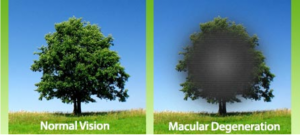Manage your Macular Degeneration (AMD) with Eye Doctors in Apex and Zebulon, NC
Macular degeneration affects the central area of the retina, the macula, and is one of the leading causes of vision loss for people over the age of 50. The National Eye Institute predicts that by 2020, macular degeneration will affect nearly 3 million people.
As our population grows older, the optometrists at NC Eye Associates are committed to identifying and monitoring age-related macular degeneration (AMD) early and closely. If treatment is necessary, we work with the best vitreo-retinal specialists in the area to help provide our patients with the best possible outcomes.
What is a Macular Degeneration?
Macular degeneration, also referred to as age-related macular degeneration or AMD, is a progressive eye disease that results from the deterioration of the central portion of the retina, the macula. This part of the retina that is responsible for clear central vision.

AMD becomes apparent later in life secondary to a breakdown in a lining, bruch’s membrane, between the retina and the underlying vascular network, the choroid. This allows deposits of lipofuscin or drusen to form in the posterior retina, potentially affecting vision (Dry AMD). As the disease process progresses, new vessels may grow through bruch’s membrane into the retina leaking fluid and subsequently leading to severe vision loss (Wet AMD).
AMD is one of the leading causes of vision loss and blindness, so it’s imperative to see your optometrist for regular eye exams, so it can be caught early.
Who is at risk for AMD?
Though younger people sometimes develop macular degeneration, this is mostly an age-related disease that affects adults over the age of 50. Adults that smoke, are obese, have high cholesterol, high blood pressure, and/or a family history are especially at risk.
Dry vs. Wet Macular Degeneration
There are two main types of age-related macular degeneration:
Dry Macular Degeneration
This is the early type of AMD. It’s diagnosed in the early or intermediate stage of the disease and results in the thinning of the macula and/or lipofuscin deposition (drusen) and pigment dispersion in the area. Significant retinal atrophy referred to as geographic atrophy, may also occur in this stage of the disease. Symptoms include blurred and/or distorted central vision, and blind spots, which can make it difficult to drive or recognize faces.
Wet Macular Degeneration
This is the most severe form of AMD. Wet macular degeneration occurs when blood vessels begin to grow into the retina at the location of the macula. These vessels leak blood and fluid, causing the macula to swell and damage the retinal tissue. Patients typically suffer from significant reduction in visual acuity at this point and require treatment to reduce swelling in the macula.
Dry macular degeneration can develop into wet macular degeneration and a good prognosis is highly dependent how quickly the condition is diagnosed, so contact an optometrist immediately for a screening.
Macular Degeneration Treatment
Macular degeneration is a progressive disease. There’s no cure, but its progression can be slowed down via dietary changes and AREDS II supplements. If the condition worsens to the wet form, patients may need to be seen at the vitreo-retinal clinic for Anti-VEGF intravitreal therapy (Eylea, Lucentis, or Avastin) and sometimes laser therapy.
Contact the AMD Eye Care Professionals at NC Eye Associates
Diagnosing age-related macular degeneration in its early stages is key to an optimal prognosis. By scheduling routine eye exams, you will reduce your chances of experiencing vision loss due to AMD.
The optometrists at NC Eye Associates offer whole-health eye care services that include screening and monitoring macular degeneration and co-management with a vitreoretinal specialist, when required.
Request an appointment with NC Eye Associates at our Apex or Zebulon, NC location for high-quality AMD management using the latest technology available in eye care.

